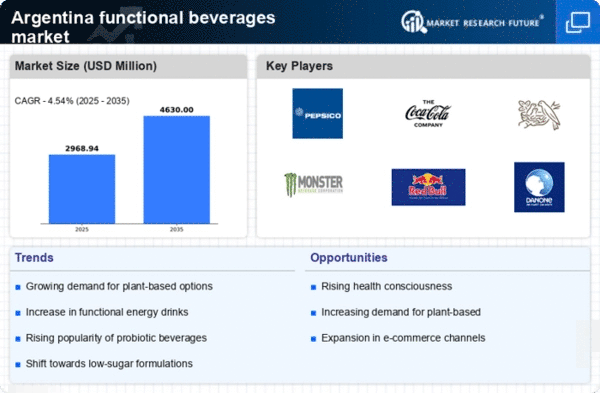Increased Health Consciousness
In Argentina, the functional beverages market is significantly influenced by rising health consciousness among consumers. This trend is characterized by a shift towards products that promote overall well-being, including immunity-boosting and energy-enhancing beverages. Recent surveys indicate that approximately 60% of Argentine consumers actively seek functional beverages that provide specific health benefits. This growing awareness is prompting manufacturers to develop products that cater to these demands, such as fortified drinks with vitamins and minerals. The emphasis on health and wellness is expected to drive market growth, with projections suggesting a compound annual growth rate (CAGR) of around 8% over the next five years. As consumers become more discerning, brands that effectively communicate the health benefits of their products are likely to thrive in the competitive functional beverages market.
Innovative Product Development
The functional beverages market in Argentina is witnessing a surge in innovative product development, as companies strive to differentiate themselves in a crowded marketplace. This innovation encompasses a wide range of offerings, from probiotic drinks to adaptogenic beverages designed to enhance mental clarity and reduce stress. In 2025, it is anticipated that innovative products could represent nearly 40% of total market sales, highlighting the importance of creativity in product formulation. Companies are increasingly investing in research and development to create unique flavors and functional benefits that appeal to diverse consumer preferences. This focus on innovation not only attracts health-conscious consumers but also encourages trial and repeat purchases, thereby driving overall market growth. As competition intensifies, the ability to introduce novel products will be a key determinant of success in the functional beverages market.
Growing Demand for Natural Ingredients
The functional beverages market in Argentina experiences a notable shift towards natural ingredients, driven by consumer preferences for healthier options. This trend indicates a growing awareness of the benefits associated with natural components, such as herbal extracts and organic fruits. In 2025, it is estimated that the market for natural functional beverages could account for approximately 35% of total sales, reflecting a significant increase from previous years. Consumers are increasingly scrutinizing labels, seeking products that align with their health goals. This demand for transparency and authenticity in ingredient sourcing is reshaping the competitive landscape, compelling manufacturers to innovate and reformulate their offerings. As a result, brands that prioritize natural ingredients are likely to gain a competitive edge in the functional beverages market.
Rise of E-commerce and Online Retailing
The functional beverages market in Argentina is experiencing a transformation due to the rise of e-commerce and online retailing. This shift is driven by changing consumer shopping habits, with more individuals opting for the convenience of online purchases. In 2025, it is projected that online sales could account for approximately 25% of total functional beverage sales, reflecting a significant increase from previous years. E-commerce platforms provide consumers with access to a wider variety of products, including niche and specialty functional beverages that may not be available in traditional retail outlets. This trend is encouraging brands to enhance their online presence and invest in digital marketing strategies to reach a broader audience. As the market continues to adapt to this digital landscape, the ability to effectively leverage e-commerce will be essential for success in the functional beverages market.
Sustainability and Eco-Friendly Practices
Sustainability is becoming a pivotal driver in the functional beverages market in Argentina, as consumers increasingly prioritize eco-friendly practices. This trend is reflected in the growing demand for products packaged in recyclable materials and those produced through sustainable sourcing methods. In 2025, it is estimated that around 30% of consumers will actively seek out brands that demonstrate a commitment to environmental responsibility. This shift is prompting manufacturers to adopt greener practices, from sourcing ingredients to production processes. Brands that successfully communicate their sustainability efforts are likely to resonate with environmentally conscious consumers, thereby enhancing brand loyalty. As the functional beverages market evolves, sustainability will play a crucial role in shaping consumer preferences and influencing purchasing decisions.
















